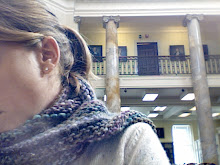 addressing the smart concerns about the novel as a educational tool...
addressing the smart concerns about the novel as a educational tool...thanks go to maura and aaron for raising some terrific questions about the novel as a mode of education. i'll be thinking about this in the coming weeks, but for now i want to quick react:
1. LMA was a teacher in a classroom in front of living students. While she eventually retired her chalk, she always maintained that what she was trying to do was solve the problem of american education in a real, pragmatic way. but you are all correct, when she was composing, she was free from the all-too-real exigences of the classroom. you are also right to suggest that this genre allowed a level of freedom never open to ABA. but we have to remember that her liberated representations of pedagogy DID enter in a very real way into the American classroom. Her novels were bound as textbooks and assigned by American teachers. So while it may seem that her representations of teaching can never really be fruitfully compared to her father's pedagogy, I would argue that she "taught" in a way not wholly dissimilar to ABA. Teachers, in fact, wrote her letters explaining that they modeled their own teaching after her representations of Plumfield. She, not her father, was credited as the originator of progressive education.
2. as per her publishers: i've never seen anything to suggest that they dictated anything in Little Men. They insisted on a sequel to Little Women, but nothing else.
3. i have no intention of conflating the activities of ABA and LMA. you are all right, it's slippery and my own pedagogical concerns often intrude. but i still believe that it's a potentially fruitful exploration. presumably all of us believe in a very real way in the pedagogical utility of the novel. we're not teaching straight aesthetics, right?
4. i do intend to hook both father and daughter's educational thought to shifting notions of the child in the period. this will help clarify their very different textual representations.
5. finally, i have no real desire to destroy ABA and champion LMA. Instead, I want to use ABA to point us to this pedagogical concern (how to allow the child freedom and simultaneous shape her -- as we all want, on some level, to do) and then consider LMA's pedagogical formulations as a kind of answer to that concern. Of course, Plumfield does not exist, but I think that her hybrid pedagogy -- acknowledging and advocating a central authority and only then opening a space for children to guide their own learning (in the end of Little Men Dan and Demi have struck a deal without Jo's knowledge to teach one another. Dan will teach Demi natural history and Demi will teach Dan self control and christian ethics) makes sense to me. As a teacher, I never forget my authority and I know that wherever I stand in the classroom, I'm the one standing. But when I put on a charade and pretend that the students are calling the shots, we all know it's a ruse and they seem to resent the false sense of control. Perhaps LMA is right, that only when we leave the schoolhouse -- and go inside the novel or outside into nature -- can we actually drop resolve the problem of authority.
but these are just quick reactions off the top of my head. more to come.
I can't thank you enough for engaging with me on this project. I've always said that I'm no good in isolation.
--Anne, not the autodidact.

No comments:
Post a Comment